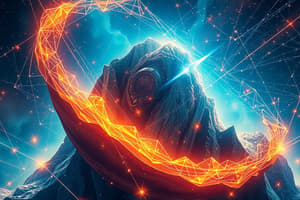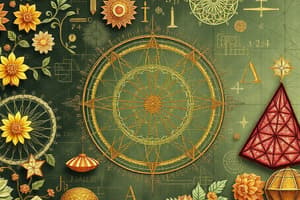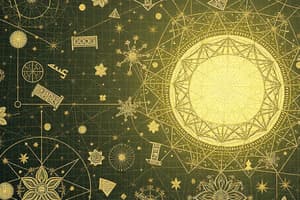Podcast
Questions and Answers
Which branch of mathematics primarily deals with the study of shapes and spatial relationships?
Which branch of mathematics primarily deals with the study of shapes and spatial relationships?
- Statistics
- Calculus
- Geometry (correct)
- Algebra
What is the main purpose of calculus in mathematics?
What is the main purpose of calculus in mathematics?
- To analyze static shapes
- To solve equations and inequalities
- To examine properties of numbers
- To study rates of change and areas under curves (correct)
Which of the following concepts involves a mathematical relationship between input and output variables?
Which of the following concepts involves a mathematical relationship between input and output variables?
- Proofs
- Statistics
- Functions (correct)
- Sets
In which branch of mathematics would you study prime numbers and divisibility?
In which branch of mathematics would you study prime numbers and divisibility?
What do axioms and postulates represent in mathematics?
What do axioms and postulates represent in mathematics?
Which application of mathematics is primarily utilized in algorithm development and data structures?
Which application of mathematics is primarily utilized in algorithm development and data structures?
Which branch of mathematics focuses on concepts like collecting, analyzing, and interpreting data?
Which branch of mathematics focuses on concepts like collecting, analyzing, and interpreting data?
Which of the following best describes discrete mathematics?
Which of the following best describes discrete mathematics?
Flashcards
What is Algebra?
What is Algebra?
A branch of mathematics that deals with symbols and equations, focusing on solving problems involving variables, expressions, and inequalities.
What is Geometry?
What is Geometry?
A branch of mathematics that studies shapes, sizes, and spatial relationships, exploring concepts like points, lines, angles, and 3D figures.
What is Calculus?
What is Calculus?
A branch of mathematics focused on change, utilizing concepts like derivatives and integrals to analyze rates of change and areas under curves.
What is Number Theory?
What is Number Theory?
Signup and view all the flashcards
What is Statistics?
What is Statistics?
Signup and view all the flashcards
What is Probability?
What is Probability?
Signup and view all the flashcards
What is Discrete Mathematics?
What is Discrete Mathematics?
Signup and view all the flashcards
What is a Set?
What is a Set?
Signup and view all the flashcards
Study Notes
Topic Subtitle
- Mathematics is a broad field including algebra, geometry, calculus, number theory, and more. It uses symbols, logic, and reasoning to understand quantities, relationships, and patterns.
- Mathematics is vital for understanding and modeling phenomena across various fields, from science and engineering to business and social sciences.
Branches of Mathematics
- Algebra: Manipulates symbols and equations to solve problems, involving variables, expressions, equations, and inequalities.
- Geometry: Focuses on shapes, sizes, and spatial relationships, encompassing points, lines, angles, triangles, circles, and 3D figures.
- Calculus: Deals with change, using derivatives and integrals to study rates of change and areas under curves.
- Number Theory: Studies properties of numbers, including prime numbers, divisibility, and arithmetic relationships.
- Statistics: Collects, analyzes, interprets, and presents data.
- Probability: Analyzes the likelihood of events, calculating probabilities and random phenomena.
- Discrete Mathematics: Studies countable or finite mathematical structures, including graphs, logic, and combinatorics.
Fundamental Concepts
- Sets: Collections of objects or elements, including set operations like union, intersection, and complement.
- Functions: Mathematical relationships between variables, mapping inputs to outputs.
- Logic: Determines the validity of arguments, employing deductive and inductive reasoning.
- Proofs: Formal arguments demonstrating the truth of statements, using techniques like direct, indirect, and contradiction proofs.
- Axioms and Postulates: Accepted statements without proof, forming the basis for deriving theorems.
- Theorems: Proven statements based on logical reasoning.
Applications of Mathematics
- Science and Engineering: Models phenomena, predicts outcomes, and designs solutions.
- Computer Science: Essential for algorithm development, data structures, and computer graphics.
- Finance: Used for investment analysis, risk management, and actuarial science.
- Business: Supports forecasting, optimization, and decision-making across industries.
- Social Sciences: Statistics and probability analyze data and trends.
Key Mathematical Tools
- Equations: Represent relationships between variables.
- Graphs: Visualize mathematical relationships.
- Mathematical Symbols: Represent concepts and operations.
- Algorithms: Step-by-step problem-solving procedures.
Studying That Suits You
Use AI to generate personalized quizzes and flashcards to suit your learning preferences.




